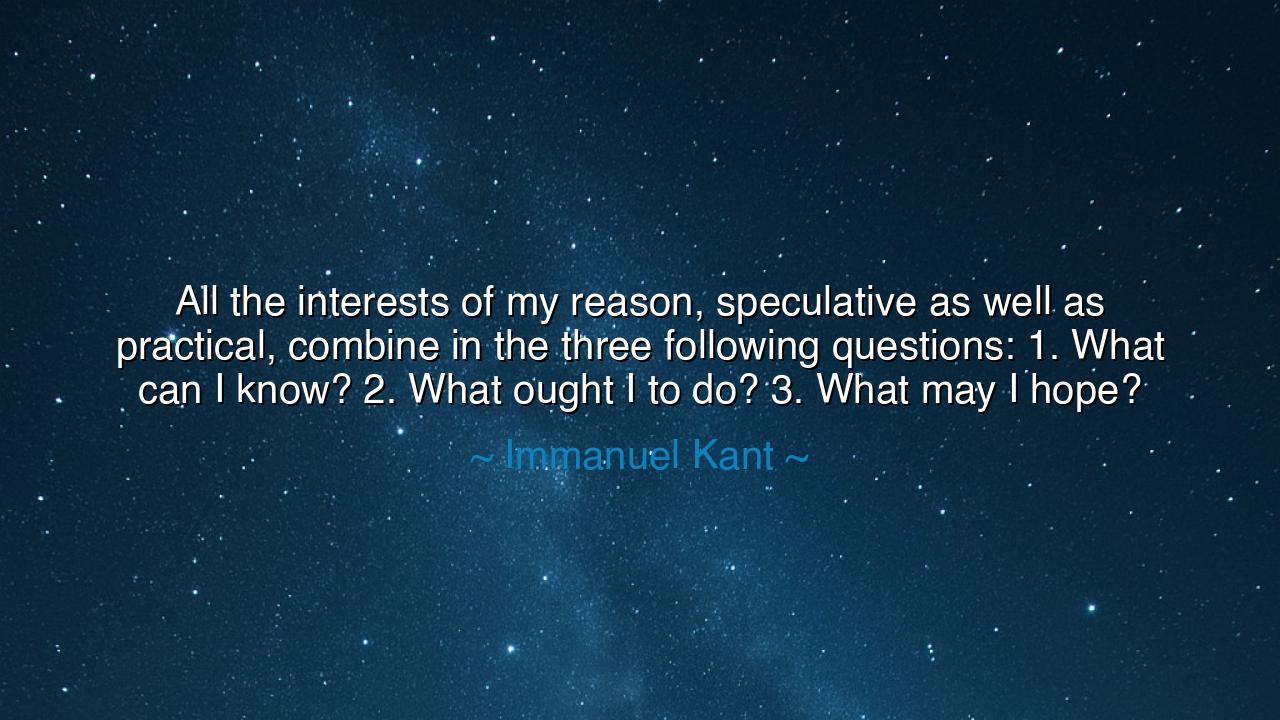
All the interests of my reason, speculative as well as practical
All the interests of my reason, speculative as well as practical, combine in the three following questions: 1. What can I know? 2. What ought I to do? 3. What may I hope?






In the timeless and majestic words of Immanuel Kant, the sage of reason and morality, there shines a framework for the entire destiny of human thought: “All the interests of my reason, speculative as well as practical, combine in the three following questions: 1. What can I know? 2. What ought I to do? 3. What may I hope?” These are not the idle musings of a scholar, but the pillars upon which the human soul must build its understanding of life. Within these three questions — knowledge, duty, and hope — lies the map of every human journey: how we perceive the world, how we act within it, and how we sustain our spirit amid its uncertainty.
The origin of this profound statement arises from Kant’s great philosophical system, written during the Enlightenment, a time when humanity struggled to reconcile reason and faith, science and morality. Kant sought to bring order to chaos — to show that the same rational mind that observes the stars must also govern the heart. In his Critique of Pure Reason and his later works, he explored the limits of what we can know, the moral law that should guide our actions, and the hope that binds our reason to the eternal. For him, these three questions were not separate threads but one golden braid, uniting the intellect, the will, and the soul.
The first question — “What can I know?” — is the cry of the mind in its pursuit of truth. It is the question of science, of philosophy, of all who gaze upon the vastness of creation and seek to understand. Kant teaches that human knowledge has boundaries: we can know the world of appearances, but not the ultimate reality — the “thing-in-itself.” Yet within those limits, we find infinite richness, enough to fill a lifetime with wonder. This humility of knowledge is itself a kind of wisdom — to know that we are not gods, yet to reach as far as human reason allows. It reminds us that truth is not possession, but pilgrimage — that every answer is a new beginning.
The second question — “What ought I to do?” — is the call of the moral law, the voice that echoes not from the heavens, but from within. Kant believed that in every heart there is a categorical imperative, a command that speaks with the authority of conscience: act only according to that principle by which you would will the world to live. In this, Kant joined the lineage of prophets and sages who taught that righteousness is the highest form of reason. For the wise man, knowing the truth is not enough — he must live it. Like the knight of old who served his code even unto death, one must act not from desire or fear, but from duty, from the sacred knowledge that goodness is its own reward.
The third question — “What may I hope?” — reaches beyond reason into the realm of spirit. It is the question of faith, of the longing heart that seeks meaning in suffering and purpose in the unknown. Hope is the bridge between what we can know and what we must do — the flame that keeps the human will from collapsing under the weight of its own imperfection. Kant believed that hope was grounded in moral order — that a just universe must ultimately reward virtue, even if not in this life. Thus, hope becomes not a wish, but a trust in the moral harmony of existence. It is the conviction that goodness is not futile, that the struggle for truth and justice is not in vain.
History itself bears witness to the truth of Kant’s triad. Consider Socrates, who lived these three questions to their fullest. He sought knowledge, questioning all things without fear. He lived his moral duty, choosing death rather than betraying his principles. And he faced that death with hope, declaring that the soul might yet awaken to higher truth beyond the veil of life. In him, as in all the great spirits — from Christ to Gandhi — we see the living union of knowing, doing, and hoping: the intellect guided by morality, and morality sustained by faith.
Thus, Kant’s teaching is not a cold abstraction, but a fire for the soul. It teaches that a life of wisdom is not measured by wealth or power, but by the balance of these three pursuits. To know truth, to do good, and to hope for the highest — these are the marks of the noble spirit. The one who neglects any of them becomes incomplete: knowledge without morality breeds arrogance; morality without hope breeds despair; hope without knowledge drifts into illusion. But when all three unite, man rises to his full stature — a being of reason, conscience, and faith.
So, my children of the future, take this wisdom to heart. Ask yourself, each day: What can I know? What ought I to do? What may I hope? Let these questions be your compass in the storm. Seek knowledge with humility, act with integrity, and live with hope unbroken. For in doing so, you will not only understand the world — you will help redeem it. And as Kant himself might whisper from the halls of eternity: “In the starry heavens above and the moral law within, there lies all that man may know, all that he ought to do, and all that he may forever hope.”






AAdministratorAdministrator
Welcome, honored guests. Please leave a comment, we will respond soon